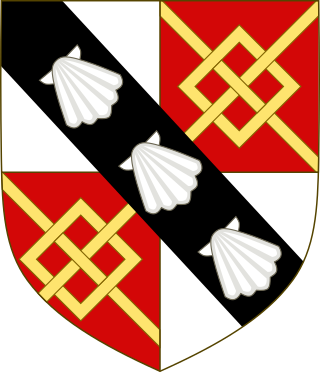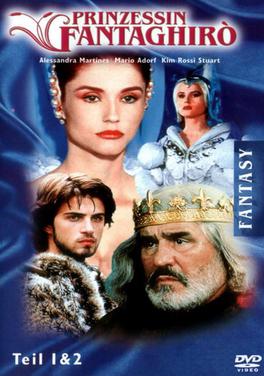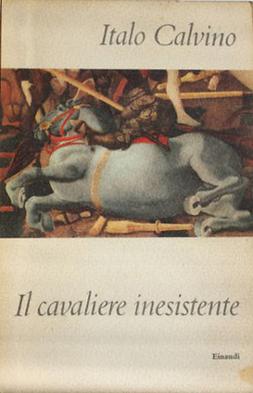
Italo Calvino was an Italian writer and journalist. His best-known works include the Our Ancestors trilogy (1952–1959), the Cosmicomics collection of short stories (1965), and the novels Invisible Cities (1972) and If on a winter's night a traveler (1979).

The Spencer family is an aristocratic British family. From the 16th century, its members have held numerous titles, including the dukedom of Marlborough, the earldoms of Sunderland and Spencer, and the Churchill barony. Two prominent members of the family during the 20th century were Sir Winston Churchill and Diana, Princess of Wales.

Orlando furioso is an Italian epic poem by Ludovico Ariosto which has exerted a wide influence on later culture. The earliest version appeared in 1516, although the poem was not published in its complete form until 1532. Orlando furioso is a continuation of Matteo Maria Boiardo's unfinished romance Orlando innamorato. In its historical setting and characters, it shares some features with the Old French La Chanson de Roland of the eleventh century, which tells of the death of Roland. The story is also a chivalric romance which stemmed from a tradition beginning in the late Middle Ages and continuing in popularity in the 16th century and well into the 17th.

The Satanic Verses is the fourth novel of the Indian-British writer Salman Rushdie. First published in September 1988, the book was inspired by the life of the Islamic prophet Muhammad. As with his previous books, Rushdie used magical realism and relied on contemporary events and people to create his characters. The title refers to the Satanic Verses, a group of Quranic verses about three pagan Meccan goddesses: Allāt, Al-Uzza, and Manāt. The part of the story that deals with the satanic verses was based on accounts from the historians al-Waqidi and al-Tabari.

Final Fantasy IV, a role-playing video game released by Square in 1991, revolves around Cecil Harvey, a knight of Baron who embarks on a quest to defeat Golbez, a man that is controlling the king of Baron. During Cecil's quest, he is joined by his childhood friends Kain Highwind and Rosa Farrell, as well as other warriors from around the world who also seek to stop Golbez. The visuals of the characters were designed by Yoshitaka Amano. After its initial release, Final Fantasy IV was later ported to multiple consoles. In 2007, Square Enix released an enhanced remake for the Nintendo DS that added voice acting to both the Japanese and English versions.

Bradamante is a fictional knight heroine in two epic poems of the Renaissance: Orlando Innamorato by Matteo Maria Boiardo and Orlando Furioso by Ludovico Ariosto. Since the poems exerted a wide influence on later culture, she became a recurring character in Western art.

Victor Alexander George Robert Bulwer-Lytton, 2nd Earl of Lytton,, styled Viscount Knebworth from 1880 to 1891, was a British politician and colonial administrator. He served as Governor of Bengal between 1922 and 1927 and was briefly Acting Viceroy of India in 1926. He headed the Lytton Commission for the League of Nations in 1931–1932, producing the Lytton Report which condemned the Japanese invasion of Manchuria and denounced Manchukuo as a Japanese puppet state.

Killyleagh Castle is a castle in the village of Killyleagh, County Down, Northern Ireland. It is believed to be one of the oldest inhabited castles in the country, with parts dating back to 1180. It follows the architectural style of a Loire Valley château, being redesigned by the architect Sir Charles Lanyon in the mid-19th century. It has been owned by the Hamilton family since the early 17th century.

The Baron in the Trees is a 1957 novel by Italian writer Italo Calvino. Described as a conte philosophique and a metaphor for independence, it tells the adventures of a boy who climbs up a tree to spend the rest of his life inhabiting an arboreal kingdom. Calvino published a new version of the novel in 1959.

Fantaghirò, also known as The Cave of the Golden Rose, is an Italian fantasy romance adventure series consisting of five television films directed by Lamberto Bava and released between 1991 and 1996. The first film was originally based on Italo Calvino's "Fanta-Ghiro the Beautiful", and takes place in a fairy tale setting, featuring princesses, princes, witches, wizards and talking animals. Shot mostly in the Czech Republic and Slovakia with the participation of local actors, and highly popular in Italy during the 1990s, it was loosely adapted into a cartoon series of the same title. A reboot series was announced in 2021.
Our Ancestors is the name of Italo Calvino's "heraldic trilogy" that comprises The Cloven Viscount (1952), The Baron in the Trees (1957), and The Nonexistent Knight (1959).

Fantaghirò is a fantasy television film produced by Reteitalia, directed by Lamberto Bava and starring Alessandra Martines. It originally aired in 1991 as a two-parter, and hence has been known in certain video releases and airings as double-set of Fantaghirò 1 and Fantaghirò 2. It is the first installment in the Fantaghirò series and is loosely based on the Italian folktale Fanta-Ghirò the Beautiful.

The Nonexistent Knight is an allegorical fantasy novel by Italian writer Italo Calvino, first published in Italian in 1959 and in English translation in 1962.

John (de) Welles, 1st Viscount Welles, KG was an English Lancastrian nobleman who was made a Knight of the Garter.

Giada Trebeschi is an Italian author of historical fiction, thrillers, theater plays and screenplays. Her novels being based on true historical events touch various topics and periods. In addition she publishes some very short stories on her blog in English and Italian.
Archibald Colquhoun (1912–1964) was a leading translator of modern Italian literature into English. He studied at Ampleforth College, Oxford University, and the Royal College of Art. Originally a painter, he worked as director of the British Institute in Naples before the Second World War, and in Seville after the war. He worked in British intelligence during wartime. He later headed Oxford University Press' initiative to bring out Italian literary classics in translation. He scored his biggest success with Lampedusa's The Leopard, a translation that is still in print. He was also one of the first translators to introduce Italo Calvino to Anglophone readers. He was the first winner of the PEN Translation Prize, which he won for his translation of Federico de Roberto's The Viceroys. He also wrote a biography of Alessandro Manzoni.

The Lyttelton family is a British aristocratic family. Over time, several members of the Lyttelton family were made knights, baronets and peers. Hereditary titles held by the Lyttelton family include the viscountcies of Cobham and Chandos, as well as the Lyttelton barony and Lyttelton baronetcy. Several other members of the family have also risen to prominence, particularly in the field of cricket.

Rubén Isaac Albarrán Ortega is a Mexican musician, singer, song writer, music producer, and activist. He is a member and founder of the alternative rock band Café Tacvba. As singer and frontman of Café Tacvba, the artist has characterized himself by his energetic attitude onstage and for presenting himself as different characters and aliases throughout his career.

Earl of Arran is a title in the Peerage of Ireland. It is not to be confused with the title Earl of Arran in the Peerage of Scotland. The two titles refer to different places: the Aran Islands in Ireland, and the Isle of Arran in Scotland. The Irish earldom is held by the Gore family. The Scottish earldom is a separate title, held as a subsidiary title of the Duke of Hamilton.

Garulfo is a six-volume fantasy graphic novel created by writer Alain Ayroles, cartoonist Bruno Maïorana and colorist Thierry Leprévost.


















